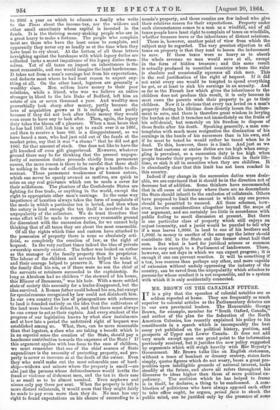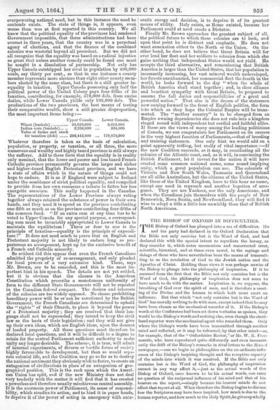MR. BROWN ON THE CANADIAN FUTURE.
IT is a pity that the speeches of colonial notables are so seldom reported at home. They are frequently as much superior to colonial articles as the Parliamentary debates are to our own provincial leaders. The Honourable George Brown, for example, member for " South Oxford, Canada," and author of the plan for the federation of the North American Colonies, has recently explained his policy to his constituents in a speech which is incomparably the best essay yet published on the political history, position, and prospects of Upper and Lower Canada. It does not add very much except upon one grand point to the information previously received, but it justifies the new policy suggested by arguments which will weigh heavily with Her Majesty's Government. Mr. Brown talks like an English statesman, without a trace of bombast or dreamy oratory, states facts simply, quotes figures which do not weary, bases a great pro- position upon intelligible grounds of national interest, looks steadily at the future, and above all refers throughout his discourse to ideas higher than those of mere political ex- pediency. The coalition which he has helped to frame is in itself, he declares, a thing to be condemned. A com- bination of politicians who have always opposed each other to take office ought, he argues, primd facie to shock the public mind, can be justified only by the presence of some overpowering national need, but in this instance the need he contends exists. The state of things is, it appears, even worse than was at first reported in this country. We all knew that the political equality of the provinces had rendered Government impossible, that three administrations had been overset in three years, that the country was in a perpetual agony of elections, and that the finance of the combined colonies was wasteful beyond all precedent. But we did not all recognize that the equality was based on a radical injustice so great that unless another remedy could be found one must be sought in a dissolution of partnership. Not only has Upper Canada outstripped her rival in population by 400,000 souls, say thirty per cent., so that in one instance a county member represents more electors than eight other county mem- bers elected by the same class, but there is a still greater in- equality in taxation. Upper Canada possessing only half the political power of the United Colony pays four-fifths of its taxation, contributing, for example, 578,000 dols. from excise duties, while Lower Canada yields only 193,000 dols. The productions of the two provinces, the best means of testing their comparative wealth, show a still greater disproportion, the most important items being:— Upper Canada. Lower Canada.
Wheat (bushels) 24,620,000 ... 2,654,000 Indian corn (bushels)... 2,256,000 ... 934,000 Value of farms and stock for taxation (dole) 306,442,000 ... 178,870,000
Whatever therefore is taken as the basis of calculation, population, or property, or taxation, or all three, the more numerous and wealthy and highly taxed province is still always the sufferer. Add to these facts that the equality is in reality only nominal, that the lesser and poorer and less taxed French Catholic province permanently governs the larger and richer and higher-taxed English Protestant province, and we have a state of affairs which in the nature of things could not hope to endure. It is as if England were subject to Ireland under the semblance of strict political equality, and compelled to provide from her own resources a tribute to fatten her less energetic associate. This really happened in the Canadas. The representatives of the Lower Province always voting together always retained the substance of power in their own hands, and they used it to spend on the province contributing one-fifth as much as on the province contributing four-fifths of the common fund. "If an extra sum at any time has to be a voted to Upper Canada for any special purpose, a correspond- ing sum must be invariably appropriated to Lower Canada to maintain the equilibrium ! Three or four to one is the principle of taxation—equality is the principle of expendi- ture I" It does not need much. to prove that an English and Protestant majority is not likely to endure long so pre- posterous an arrangement, kept up for the exclusive benefit of a French and Catholic minority.
So evident did this appear that even the French Canadians admitted the propriety of re-arrangement, and only pleaded for local powers of a very extensive kind. These, says Mr. Brown, are to be conceded, and this is the most im- portant hint in his speech. The details are not yet settled, but it is obvious that the clauses in the American Constitution which prescribe a monotonous uniformity of form to the different State Governments will not be repeated in the Canadian federal compact. The desires and interests of the colonies are too widely opposed. No clause prohibiting hereditary power will be or can be sanctioned by the British Government, the French Canadians are determined to uphold the "rights" of their Church, to place it beyond the power of a Protestant majority ; they are resolved that their lan- guage shall not be superseded; they intend to keep the civil law as the basis of their legislation; and they will not give up their own ideas, which are English ideas, upon the descent of landed property. All these questions must therefore be declared local questions, and it will be difficult to a degree to retain for the central Parliament sufficient authority to make unity any longer desirable. Tho scheme, it is true, will admit of internal experiments, of diverse or hostile forms of society highly favourable to development, but then so would sepa- rate colonial life, and the Coalition may go so far as to destroy the national sentiment they obviously wish to foster, to create an antagonism of civilizations in place of an antagonism of geo- graphical position. This is the rock upon which the Ameri- can Union has split, and if the new Ministry does not deal very tenderly with the matter it will find that it has created a powerless and therefore usually mischievous central assembly. It is the enormous power of Parliament, its sense of responsi- bility, which steadies its action, and to bind it in paper bonds, to deprive it of the power of acting in emergency with auto-
cratic energy and decision, is to deprive it of its greatest means of utility. Italy exists, as Rome existed, because her Parliament could at need create a Dictator.
Finally Mr. Brown approaches the greatest subject of all, the political future to which these colonies are to look, and upon that point he is distinct and emphatic. He does not want annexation either to the North or the Union. On the other hand, he does not believe that Great Britain will for ever lend her fleet and her soldiers to colonies from which she gains nothing that independent States would not yield. He accepts the third alternative, and remembering that British America is larger than the United States, that her population is incessantly increasing, her vast mineral wealth undeveloped, her forests unexhausted, her commercial fleet the fourth in the world, he looks forward to the day " when the whole of British America shall stand together ; and, in close alliance and heartiest sympathy with Great Britain, be prepared to assume the full duties and responsibilities of a great and powerful nation." That also is the dream of the statesmen now coming forward to the front of English politics, the form into which as they hope the Colonial Empire will be trans- muted. The "mother country" is to be changed from an Empire owning dependencies she does not rule into a kingdom ringed round with independent but cordial and faithful allies. If these are the views of many among the leading politicians of Canada, we can congratulate her Parliament on its success in the very highest function of Parliaments,—that of breeding and training statesmen. One only hint we would add on a point apparently trifling, but really of vital importance :—If the new Coalition succeeds, as it may, in conciliating all the colonies of the Atlantic coast, and, as it will, in convincing the British Parliament, let it invent for the nation it will have created some common national name, some sound implying unity, which a great population can use. The colonists of Victoria and New South Wales, Tasmania and Queensland are all alike Australians, but the citizens of the United States, like those of the United Kingdom, have to this hour no name, except one used in reproach and another. .begotten of arro- gance. They are not Yankees, nor the only Americans, and when the Canadians join themselves with the people of New Brunswick, Nova Scotia, and Newfoundland, they will find it wise to adopt a title a little less unwieldy than that of British North Americans.































 Previous page
Previous page